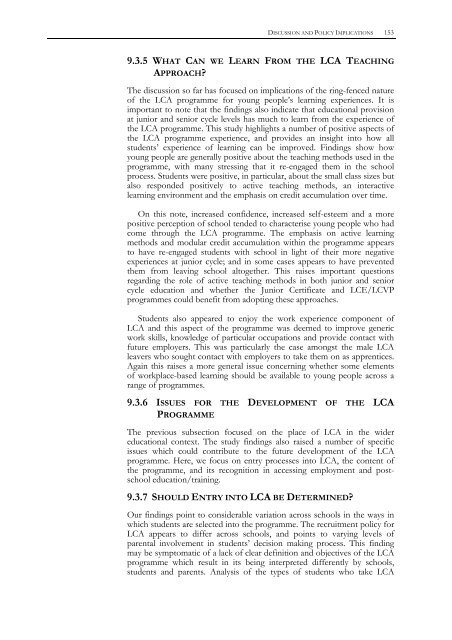Student Experiences of the Leaving Certificate Applied Programme
Student Experiences of the Leaving Certificate Applied Programme
Student Experiences of the Leaving Certificate Applied Programme
Create successful ePaper yourself
Turn your PDF publications into a flip-book with our unique Google optimized e-Paper software.
DISCUSSION AND POLICY IMPLICATIONS 1539.3.5 WHAT CAN WE LEARN FROM THE LCA TEACHINGAPPROACH?The discussion so far has focused on implications <strong>of</strong> <strong>the</strong> ring-fenced nature<strong>of</strong> <strong>the</strong> LCA programme for young people’s learning experiences. It isimportant to note that <strong>the</strong> findings also indicate that educational provisionat junior and senior cycle levels has much to learn from <strong>the</strong> experience <strong>of</strong><strong>the</strong> LCA programme. This study highlights a number <strong>of</strong> positive aspects <strong>of</strong><strong>the</strong> LCA programme experience, and provides an insight into how allstudents’ experience <strong>of</strong> learning can be improved. Findings show howyoung people are generally positive about <strong>the</strong> teaching methods used in <strong>the</strong>programme, with many stressing that it re-engaged <strong>the</strong>m in <strong>the</strong> schoolprocess. <strong>Student</strong>s were positive, in particular, about <strong>the</strong> small class sizes butalso responded positively to active teaching methods, an interactivelearning environment and <strong>the</strong> emphasis on credit accumulation over time.On this note, increased confidence, increased self-esteem and a morepositive perception <strong>of</strong> school tended to characterise young people who hadcome through <strong>the</strong> LCA programme. The emphasis on active learningmethods and modular credit accumulation within <strong>the</strong> programme appearsto have re-engaged students with school in light <strong>of</strong> <strong>the</strong>ir more negativeexperiences at junior cycle; and in some cases appears to have prevented<strong>the</strong>m from leaving school altoge<strong>the</strong>r. This raises important questionsregarding <strong>the</strong> role <strong>of</strong> active teaching methods in both junior and seniorcycle education and whe<strong>the</strong>r <strong>the</strong> Junior <strong>Certificate</strong> and LCE/LCVPprogrammes could benefit from adopting <strong>the</strong>se approaches.<strong>Student</strong>s also appeared to enjoy <strong>the</strong> work experience component <strong>of</strong>LCA and this aspect <strong>of</strong> <strong>the</strong> programme was deemed to improve genericwork skills, knowledge <strong>of</strong> particular occupations and provide contact withfuture employers. This was particularly <strong>the</strong> case amongst <strong>the</strong> male LCAleavers who sought contact with employers to take <strong>the</strong>m on as apprentices.Again this raises a more general issue concerning whe<strong>the</strong>r some elements<strong>of</strong> workplace-based learning should be available to young people across arange <strong>of</strong> programmes.9.3.6 ISSUES FOR THE DEVELOPMENT OF THE LCAPROGRAMMEThe previous subsection focused on <strong>the</strong> place <strong>of</strong> LCA in <strong>the</strong> widereducational context. The study findings also raised a number <strong>of</strong> specificissues which could contribute to <strong>the</strong> future development <strong>of</strong> <strong>the</strong> LCAprogramme. Here, we focus on entry processes into LCA, <strong>the</strong> content <strong>of</strong><strong>the</strong> programme, and its recognition in accessing employment and postschooleducation/training.9.3.7 SHOULD ENTRY INTO LCA BE DETERMINED?Our findings point to considerable variation across schools in <strong>the</strong> ways inwhich students are selected into <strong>the</strong> programme. The recruitment policy forLCA appears to differ across schools, and points to varying levels <strong>of</strong>parental involvement in students’ decision making process. This findingmay be symptomatic <strong>of</strong> a lack <strong>of</strong> clear definition and objectives <strong>of</strong> <strong>the</strong> LCAprogramme which result in its being interpreted differently by schools,students and parents. Analysis <strong>of</strong> <strong>the</strong> types <strong>of</strong> students who take LCA

















